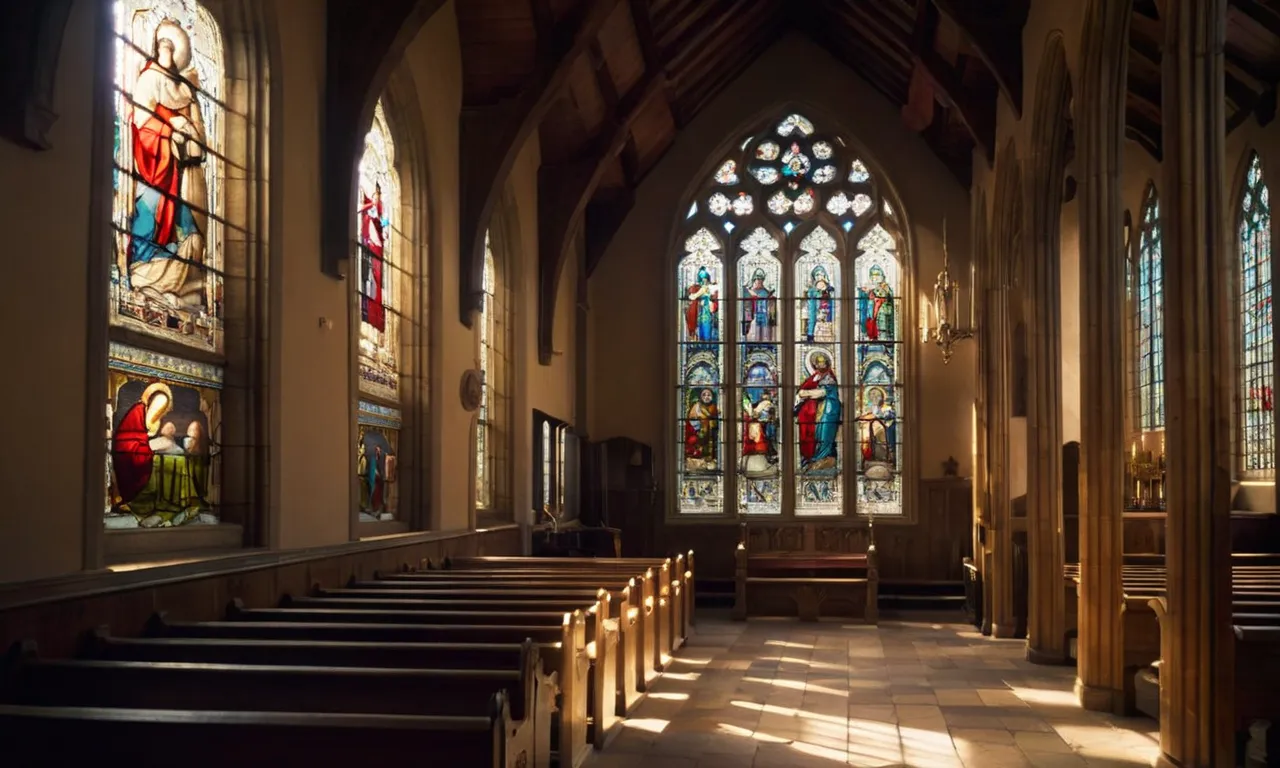Who Was Never Born And Never Died In The Bible
The question of who was never born and never died in the Bible is an intriguing one that has fascinated readers and scholars alike. If you’re short on time, here’s a quick answer: According to the Bible, Melchizedek seems to have had no origin story and his death is also not recorded, leading some to speculate he had no beginning or end.
In this comprehensive article, we will dive deep into the biblical figure of Melchizedek and analyze the evidence around his eternal nature. We will examine key passages about Melchizedek from the Old and New Testaments, look at theories from theologians over the years, and explore the continued mystery and intrigue around this enigmatic character.
The Mysterious Melchizedek: Biblical Accounts
First mention in Genesis 14
The first mention of Melchizedek in the Bible is in Genesis 14, where he is described as the king of Salem (an early name for Jerusalem) and a “priest of God Most High.” Abraham encounters Melchizedek after rescuing his nephew Lot and meeting the king upon Abraham’s return.
Melchizedek blesses Abraham and receives from him a tithe of the spoils. There is no account of Melchizedek’s parentage or genealogy, adding an air of mystery.
Psalm 110 prophecy
In Psalm 110, there is a prophecy about a coming messianic king and priest who is said to follow the “order of Melchizedek.” This establishes the importance of understanding who Melchizedek was. Theologians see this as a prophecy about Christ’s eventual priestly rule.
But the lack of background on Melchizedek himself raises questions.
Book of Hebrews analysis
The longest discussion of Melchizedek comes in the New Testament Book of Hebrews, especially chapter 7. The writer emphasizes that Melchizedek had no recorded ancestry or descendants. This allows Christ to be compared to him as an eternal priest “in the order of Melchizedek.”
As a prototype for the coming Messiah, Melchizedek remains a figure shrouded in mystery – a priest who appears on the stage of history without a known beginning or end.
Clues Pointing to Melchizedek’s Eternal Nature
No recorded origin or parents
Unlike other biblical figures, there is no record in Scripture about Melchizedek’s birth, lineage or ancestry. No details are provided on his parents, his origin, his tribe or his death. He appears abruptly on the scene when Abram returns from battle in Genesis 14:18, as if out of nowhere.
This lack of ancestry distinguishes him from other priests and strongly hints at an eternal, otherworldly nature not tied to human genealogy.
In Hebrews 7:3, the writer notes this striking absence of recorded parentage: “Without father or mother, without genealogy, without beginning of days or end of life, resembling the Son of God, he remains a priest forever.”
This description sets Melchizedek apart with an aura of mystery befitting an eternal being.
No recorded death
There is also no record of Melchizedek’s death or final years in Scripture, which was unusual for biblical figures. He appears on the stage offering bread and wine to Abram in Genesis 14:18-20, blesses him, and then disappears.
Psalm 110:4 predicts the coming Messiah will be a “priest forever in the order of Melchizedek.” The fact that his priesthood is said to be everlasting, like the “Son of God” in Hebrews 7:3, points to his immortality.
This stands in sharp contrast to the detailed records of the birth, genealogy, parents, children, age at death and final years of other patriarchs like Abraham, Isaac and Jacob. As an eternal being, Melchizedek seems to transcend the usual human life cycle.
Parallels to the Son of God
Melchizedek’s mysterious nature and eternality in Scripture have striking parallels to divine, messianic descriptions of Jesus Christ. Jesus is depicted as the eternal Logos and “only begotten Son” who comes down from heaven (John 1:1, 3:16).
Similarly, Melchizedek has an aura of eternity with no record of his birth, death or descent.
Furthermore, Hebrews 7:1-3 makes an explicit comparison between Melchizedek and Jesus as eternal heaven-sent figures: Jesus “has become a high priest forever, in the order of Melchizedek.” Both are priests appointed directly by God without reference to ancestry.
The parallels continue with Melchizedek’s offering of bread and wine prefiguring Christ’s Last Supper symbols (Matt 26:26-29).
Ultimately the superior priesthood of the divine Christ supplants the Melchizedek priesthood, according to Hebrews 7:11-22. Nevertheless, the Genesis account of Melchizedek serves as an early mysterious foreshadowing of the Son of God’s later incarnation and eternal priesthood.
Theories and Perspectives on Melchizedek’s Identity
Literal immortal figure
Some biblical scholars take the references to Melchizedek in Genesis 14 and Hebrews 7 as indicating he was an actual immortal person who served as the king of Salem and a priest of God Most High (El Elyon) (Genesis 14:18).
Theories include that he was a Christophany, a pre-incarnate appearance of Christ, or an archetypal prototype of the Messiah. His lack of recorded genealogy and the statement that he remains a priest forever in Hebrews 7:3 are viewed as evidence of his immortality.
Angelic being
Other perspectives identify Melchizedek as an angelic being or heavenly power sent by God. Supporters of this view note qualities that transcend human limitations, his solemn blessing of Abram, receiving tithes from him, and parallels to angelic guides in other scriptural theophanies.
Some connect Melchizedek with Michael the Archangel. Jewish mysticism describes him as an angelic servant of God.
Christophany theory
Many Christian theologians see Melchizedek as a Christophany, or appearance of the preexistent Christ before his incarnation. Parallels are drawn between Melchizedek and Jesus, as eternal high priests, kings of righteousness and peace.
Just as Melchizedek had no recorded birth or death, Christ has always existed. This typological association is seen in Psalm 110:4 and extensively developed in the book of Hebrews (5:6, 10; 6:20; 7:1-28).
Archetype theory
Philosophical interpretations view Melchizedek as an eternal archetype embodying the royal priesthood. Just as Plato proposed ideal “Forms” that earthly objects copy, Melchizedek reflects the original form of righteousness, peace, and priestly mediation between God and humanity.
The Melchizedek priesthood in Hebrews symbolizes sanctification and access to God based on eternal spiritual realities that transcend the mortal sphere. This perspective sees Melchizedek himself as less historically important than the ideals he represents.
Significance and Enduring Mystery of Melchizedek
Melchizedek is one of the most fascinating and mysterious figures in the Bible. He appears briefly in the Old Testament, but his significance and identity have been debated for centuries. Here’s an overview of who Melchizedek was and why he remains such an enduring biblical mystery.
His Appearance in Scripture
Melchizedek first appears in Genesis 14, where he meets and blesses Abram after Abram’s victory in battle. The text says, “Melchizedek king of Salem brought out bread and wine. He was priest of God Most High, and he blessed Abram” (Genesis 14:18-19).
This is the first mention of anyone being a priest of the Most High God.
Later, in Psalm 110, there is a prophecy that the Messiah would be a “priest forever in the order of Melchizedek.” This helps establish the importance of Melchizedek as a predecessor to Jesus Christ.
His Identity
There has been a lot of speculation about who exactly Melchizedek was. Here are some of the theories:
- A historical king and priest living in the land of Canaan
- An appearance of the pre-incarnate Christ
- An angelic being or heavenly priest
- A metaphor for the mystery of Christ’s eternal priesthood
The Bible gives very few biographical details about Melchizedek. He is called the “king of Salem” (likely Jerusalem) and “priest of God Most High,” but there’s no record of his parents, origin, or death. Some find this curious, as the Bible typically includes genealogical records.
Why the Intrigue?
There are several reasons Melchizedek remains such an intriguing biblical figure:
- His sudden appearance and disappearance: Melchizedek arrives on the scene to meet Abram, then disappears, with no mention of his origins or death.
- His parallels to Christ: The bread, wine, blessing of Abram, and prophecy in Psalm 110 link Melchizedek to Jesus as a priestly forerunner.
- The meaning of his name: In Hebrew, “Melchizedek” means “king of righteousness.” His kingship over Salem means he ruled over “peace.” This has symbolic meaning.
For these reasons, Melchizedek remains shrouded in some mystery. His brief appearance in Scripture seems intentionally unusual, as if to point forward to the ultimate mystery of Christ’s eternal priesthood.
The writer of Hebrews acknowledges that there is much “we have to say about this, but it is hard to make it clear” (Hebrews 5:11). And so Melchizedek endures as a biblical figure of intrigue.
Conclusion
In the end, the biblical figure of Melchizedek remains shrouded in intriguing mystery. While debate continues on his exact identity, the lack of recorded beginning or end sets him apart from all other human characters of the Bible.
The perpetual priesthood associated with him seems to point to some eternal, otherworldly nature that fascinates and inspires continued examination.
So when searching the scriptures for someone who seems to have never been born and never died, Melchizedek stands out as the prime candidate – a figure woven throughout the Bible’s pages, stretching from Genesis to Revelation, leaving clues about realms beyond mortal understanding.








